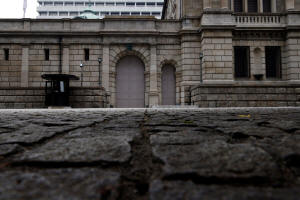BOJ to raise inflation forecast, but keep dovish bias on global slowdown
risk
 Send a link to a friend
Send a link to a friend
 [July 07, 2022] By
Leika Kihara and Takahiko Wada [July 07, 2022] By
Leika Kihara and Takahiko Wada
TOKYO (Reuters) - The Bank of Japan is
expected to raise its inflation forecast but maintain ultra-low interest
rates at this month's policy meeting, sources say, as fears of a U.S.
recession and rising input costs cloud the outlook for its fragile
economic recovery.
In a quarterly report due at the July 20-21 meeting, the BOJ is likely
to project core consumer inflation will slightly exceed its 2% target in
the current fiscal year ending in March 2023, up from the present
forecast of 1.9% made in April, the sources say.
It may also offer a more upbeat view on inflation expectations compared
with the current assessment that they are "rising mainly in the
short-term horizon," they say.
But with inflation still much more modest than in Western nations, the
BOJ sees little need to tweak its dovish policy guidance that keeps it
an outlier among a global wave of central banks which are raising rates,
say three sources familiar with its thinking.
"Price rises are broadening and inflation expectations are heightening.
But economic uncertainty is very high," said one of the sources, a view
echoed by a second source.

"What's important is for wages and services prices to rise more, which
will largely depend on the strength of the economy going forward," a
third source said.
The BOJ is expected to project core consumer inflation will slow to
around 1% in fiscal 2023 as the effect of rising fuel costs dissipate,
the sources said.
The central bank is set to cut this fiscal year's economic growth
forecast from the current 2.9%, mostly reflecting the hit to output from
supply disruptions caused by China's strict COVID-19 lockdowns, they
said.
[to top of second column] |

Exterior of Bank of Japan's headquarter is pictured in Tokyo, Japan,
June 17, 2022. REUTERS/Kim Kyung-Hoon

Analysts polled by Reuters expect Japan's economy to expand 2.2%, and core
consumer inflation to hit 2.1%, in the current fiscal year.
Core consumer inflation hit 2.1% in May from a year earlier, matching a
seven-year high hit in April, due largely to rising fuel and imported raw
material costs.
Recent surveys have shown household and corporate inflation expectations are
heightening, with firms projecting inflation to stay around 2% for years to
come.
But BOJ Governor Haruhiko Kuroda has said such cost-push inflation will not prod
the central bank to withdraw monetary stimulus, unless wages and inflation
expectations rise more.
At this month's policy meeting, the BOJ is set to keep unchanged its -0.1%
target for short-term rates and that for the 10-year bond yield around 0% as it
focuses on supporting the tepid economy.
Japan has lagged other major economies in emerging from the pandemic's hit, with
consumption only just beginning to pick up after restrictions on economic
activity were lifted.
A renewed increase in domestic COVID-19 cases is a cause of concern for
policymakers, who are clinging to hopes that consumers will boost spending
during the summer by tapping savings accumulated during the pandemic.
While the BOJ will roughly maintain its view the economy will continue to
recover, it will warn of heightening risks such as slowing global growth and the
potential hit to consumption from rising living costs, the sources said.
(Reporting by Leika Kihara and Takahiko Wada; Editing by Kim Coghill)
[© 2022 Thomson Reuters. All rights
reserved.]This material may not be published,
broadcast, rewritten or redistributed.
Thompson Reuters is solely responsible for this content. |